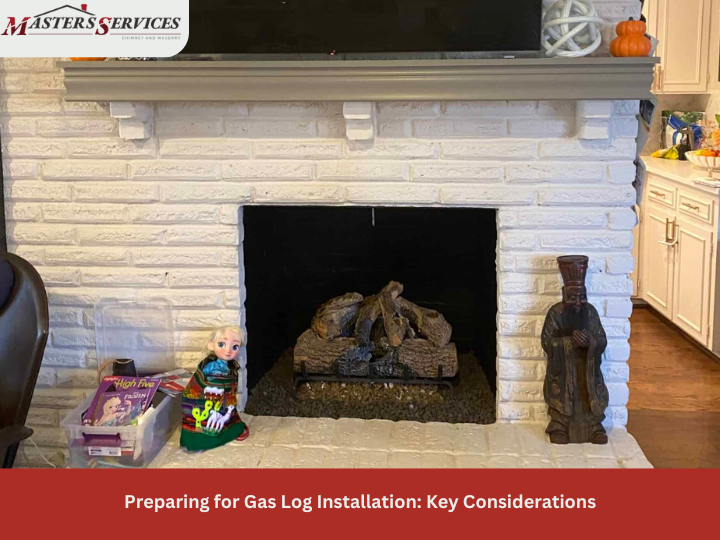Installing a gas log in your fireplace can transform your home’s ambiance and efficiency, offering a convenient and stylish alternative to traditional wood burning. However, proper preparation is crucial to ensure a successful installation and optimal performance. In this guide, we’ll cover the essential considerations to keep in mind before installing a gas log system, including the benefits, necessary preparations, and professional recommendations.
Understanding Gas Logs and Their Benefits
Before diving into the specifics of installation, it’s important to understand what gas logs are and why they are a popular choice for many homeowners. Gas logs are designed to replicate the appearance of a traditional wood fire but operate using natural gas or propane. They offer numerous advantages over wood-burning fireplaces, including:
- Convenience: Gas logs ignite with the flip of a switch, eliminating the need for kindling, firewood, and constant tending.
- Cleanliness: Unlike wood fires, gas logs produce minimal ash and no smoke, which means less cleanup and no chimney soot.
- Efficiency: Modern gas logs provide effective heating and are designed to maximize heat output, making them a cost-effective option for warming your home.
Key Considerations Before Installing Gas Logs
Assess Your Fireplace and Chimney
The condition of your fireplace and chimney plays a significant role in the installation of gas logs. Ensure that your existing fireplace is suitable for a gas log installation by checking for:
- Structural Integrity: The fireplace should be structurally sound. Look for signs of damage or deterioration in the firebox, mantel, and surrounding areas.
- Chimney Inspection: A professional chimney services provider should inspect your chimney to ensure it’s in good condition and free from blockages. This inspection will help determine if any repairs or modifications are needed before installation.
Choose the Right Gas Log Set
Selecting the appropriate gas log set for your fireplace involves considering several factors:
- Size and Style: Gas logs come in various sizes and styles to match different fireplace dimensions and aesthetic preferences. Choose a set that fits your fireplace’s size and complements your home’s decor.
- Fuel Type: Decide whether you’ll use natural gas or propane. This choice will affect the type of gas log set you need and may require additional modifications to your gas lines.
Plan for Gas Line Installation
Gas log systems require a gas line to operate. Ensure that your home’s gas line is compatible with the requirements of your chosen gas log set:
- Professional Installation: Hire a licensed professional to handle the installation of your gas line. They will ensure that the gas connection is safely and correctly set up to avoid any potential hazards.
- Safety Checks: Before installing the gas log set, perform a thorough check to confirm that all gas connections are secure and leak-free.
Consider Venting Requirements
Gas logs can be vented or vent-free, depending on your preferences and local regulations:
- Vented Gas Logs: These require a chimney or venting system to expel combustion gases. Ensure that your chimney is in good condition and properly maintained.
- Vent-Free Gas Logs: These units do not require a chimney but may need special approval or permits. Verify that your home’s ventilation meets the necessary standards for safe operation.
Evaluate Safety and Compliance
Safety is a top priority when installing a gas log system:
- Local Codes and Regulations: Check local building codes and regulations related to gas fireplace installations. Compliance is crucial to ensure the safe operation of your gas log system.
- Carbon Monoxide Detectors: Install carbon monoxide detectors in areas where gas logs will be used. This precaution helps detect any potential leaks and ensures a safe living environment.
Prepare for Professional Installation
Hiring a professional for gas log installation ensures that the process is completed correctly and safely:
- Choose a Reputable Installer: Select a qualified installer with experience in gas log installations. They will handle the setup and make necessary adjustments to ensure optimal performance.
- Schedule a Pre-Installation Inspection: Arrange for a pre-installation inspection to address any issues before the installation day. This step helps avoid delays and ensures that your fireplace and chimney are ready for the new gas log system.
Expert Dallas Chimney Services Advice for Gas Logs
Preparing for a gas log installation involves careful consideration of various factors, from assessing your fireplace and chimney to selecting the right gas log set and ensuring safety compliance. By taking these steps, you can enjoy the benefits of a gas log system and enhance the comfort of your home.
When it comes to professional installation and expert advice, Masters Services Chimney & Masonry is your trusted partner. As a leading fireplace and chimney services provider in Dallas, Texas, we specialize in installing and maintaining gas logs with precision and care. Our experienced team is dedicated to delivering top-quality service and ensuring that your gas log system operates efficiently and safely.
Ready to transform your fireplace with a gas log installation? Connect with Masters Services Chimney & Masonry today to schedule your service and enjoy the warmth and convenience of a beautifully installed gas log system. Let us help you breathe new life into your fireplace and enhance your home’s comfort.
Masters Services Chimney & Masonry – DFW
11245 Goodnight Ln #35, Dallas, TX 75229
+19728774650
